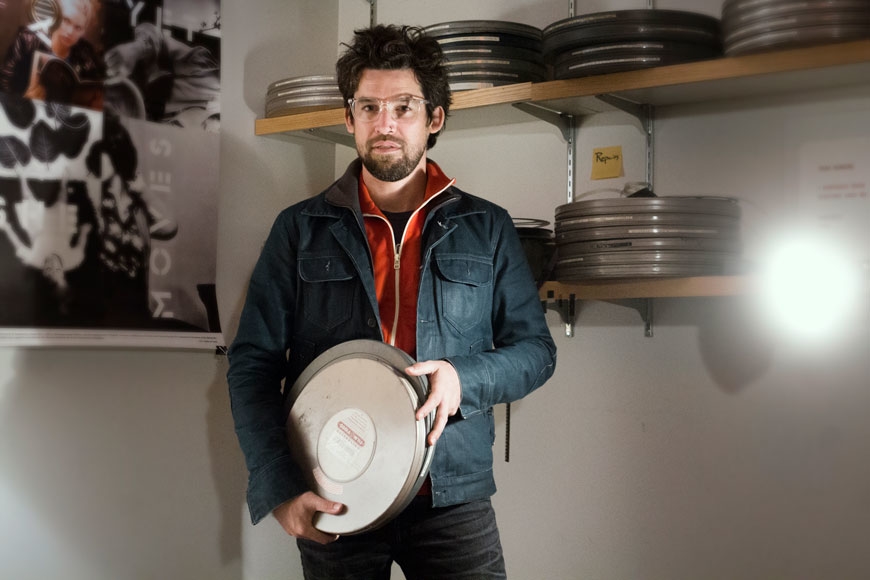Why You Shouldn’t Throw Away a “Trash Film”
What does a 90-minute “trash film” have to do with producing culture? The answer: far more than meets the eye.
Matthew Tchepikova-Treon, a fourth-year PhD student in the Department of American Studies, is currently writing his dissertation, tentatively titled "Sonic Excess & Electric Glamour: One-hundred Years of 1972." He is a recent recipient of the Harold Leonard Film Studies Research Fellowship, earned the moving image studies (MIMS) graduate minor, and helps operate the Music & Sound Studies and Moving Image & Media Studies research collaboratives through the Institute for Advanced Study.
Tchepikova-Treon studies popular music and sound technologies from 1970s exploitation films, which he defines as “often low-budget films marked by technical ineptitude that traffic in transgressive content, namely sex, violence, and all types of excess.” Tchepikova-Treon is set on finding answers to a larger question: “What can we learn about the struggle for disenfranchised artists, laborers, and communities to participate in the production of culture?”
Music Journalist Turned Scholar
Prior to pursuing his graduate studies at UMN, Tchepikova-Treon worked as a part-time musician and music journalist in Austin, Texas; Denver, Colorado; and Rochester, New York. As a music journalist, he interviewed traveling artists and wrote album and concert reviews, which led him to “explore the larger cultural conceits of music as an art form, as an industry, and as a particular mode of historiography.” Music journalism created a pathway for Tchepikova-Treon to conduct research within American studies and popular culture.
Originally pursuing a PhD in literature, Tchepikova-Treon transitioned to American studies, and UMN in particular, because of the department’s flexible, customizable, and mixed-methodological approach to research topics. He explains that with American studies “you aren’t beholden to a standard set of text, thinkers, or ideas. It allows you a certain intellectual freedom.”
“Trash Films”
Tchepikova-Treon has been researching exploitation films and their soundtracks in depth for four years, but his passion for the genre goes back to his youth, his love of horror, crime cinema, and other strains of B-film debauchery. Growing up, one of his favorite films was Gordon Parks Jr.’s 1972 blaxploitation classic Super Fly. “Underneath the plot,” he explains, “both the movie and soundtrack album tell such a rich history concerning urban decay in the 70’s, the drug crisis, the African-American employment crisis, all told by what was largely dismissed at the time as a throw-away 90-minute film, but it has this rich legacy that lives on, especially through Curtis Mayfield’s music.”
Even after the civil rights movement and the Equal Opportunity Act, the US still had industries with no entry point of employment for someone who wasn’t a heterosexual white male. “For example, within filmmaking, there were so few female and non-white individuals working,” Tchepikova-Treon explains. “What you had was a system of structural disenfranchisement, not only regarding immediate employment, but also with opportunities to participate in influencing larger social and cultural ideas through these mass art forms.” Tchepikova-Treon is particularly interested in how popular music played a role in allowing black musicians to begin working in the field of film production at levels previously unavailable to them prior to the heyday of exploitation films.
Hitting Dead Ends & Hitting the Jackpot
Unfortunately, there’s no central archive of exploitation films and their soundtracks. So Tchepikova-Treon is piecing together his archive himself, a simultaneously enjoyable and challenging task. His research has led him all over the US, including the Rock and Roll Hall of Fame in Cleveland and deep into the New York Public Library records, to find materials for his archive. He’s also interviewed musicians and sound engineers who produced some of the films he studies. “Every time I find something new, it changes the trajectory of the project,” he says. “Sometimes I realize I have to take this into account and that into account. Or you hit a dead end and have to let something go because those materials just don’t exist anymore or you haven’t been able to find them yet.” Next up, he’ll be visiting the Library of Congress in hopes of discovering more archive materials to pull together.
Tchepikova-Treon believes that part of the struggle of tracking down these films, albums, and sound technologies is the fact that their use and production were often not well-documented, which is part of the cultural problem he’s trying to address. “It’s a matter of social historiography,” he explains, “a matter of who and what culture at large decides to take note of and when.” He wants to look at how the production of exploitation films speaks to the very means by which culture is produced.
Curating Cultural Significance
This fall, Tchepikova-Treon taught a course on pop culture through which he enjoyed helping his students understand the world around them. “I don’t teach students how to get a job or how to pay bills, but I try to teach them to think critically about why and how they come to think the way they do, by what means they have determined certain values, and what that says about them or even their generation’s curation of culture,” he says.
Tchepikova-Treon is making plans to travel around the United States later this year in search of old sound technologies used for the production of 1970s cinema that are in usable condition. His goal is to obtain apprenticeship-style work with old technicians and musicians to “really engage in some of the technology and spaces” that he’s writing about. He hopes that his dissertation will help people understand the significance of exploitation films. “Though I don’t consider entertainment to be a bad word, these so-called ‘trash films’ are not only entertainment,” he says. But rather, they help us “understand what it means to participate in the production of culture as a social necessity.”
This story was written by an undergraduate student in CLA.



